The government could take a series of drastic measures in the upcoming Union Budget 2023, as it looks to cut spending and prepare for a turbulent FY24.
A Reuters poll of economists suggests that the government will tap the brakes on capital expenditure (Capex) growth, as its spending power is likely to be reduced due to weaker tax revenue collections.
As a result, food and fertiliser subsidies that significantly help India’s majority low-income population may be cut. This could have serious implications on the country’s poorer population, who depend heavily on these subsidies in the wake of falling income and high inflation.
This is because the poll found that the government is likely to cut food and fertiliser subsidies by 26 per cent to Rs 3.7 lakh crore from almost Rs 5 lakh crore expected in the current fiscal year. A few economists who participated in the poll also cautioned against such a reduction as it will impact millions of people.
Govt spending to slow down
While the Prime Minister Narendra Modi-led government has more than doubled capital spending since the financial year 2019-20, private investments continue to be a drag. However, the strong growth in government investments is believed to slow down to barely half its previous rate in FY24, according to a Reuters poll of 39 economists.
While the capital expenditure is set to increase in FY24 by about 17 per cent to Rs 8.85 lakh crore from an estimated Rs 7.5 lakh crore in the current fiscal year.
Sonal Verma, chief economist for India and Asia ex-Japan at Nomura, noted that the government has shown an “express motivation” to ramp up capex, but added that the expected absence of a robust recovery in private capital expenditure will make public capex particularly important in FY24.
It may be noted that the total of public and private investment as a proportion of the economy has declined since 2014. The Gross fixed capital formation, often used as a measure for domestic investment, has risen at a compound annual rate of just under 8 per cent since 2014, down from 14 per cent during the 10-year term of the previous government in power.
Economists polled as part of the survey also warned that a global economic slowdown could derail early signs of a modest pick-up in private sector investments.



